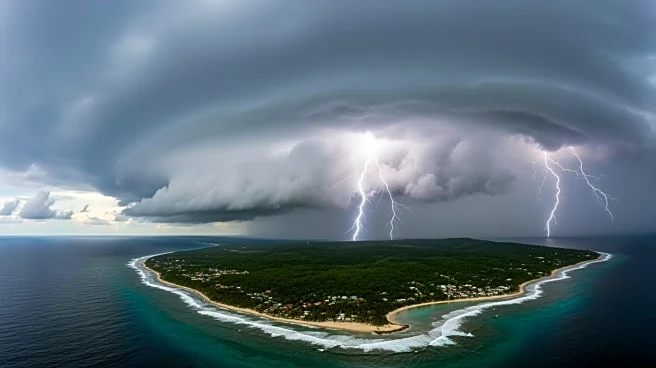What's Happening?
Hurricane Melissa has rapidly intensified into a Category 4 storm and is expected to reach Category 5 strength as it approaches Jamaica. The storm is predicted to make landfall late Monday into early Tuesday,
posing a significant threat to the island with catastrophic flooding, landslides, and storm surges. Jamaica, along with parts of Haiti and the Dominican Republic, is bracing for up to 40 inches of rain, destructive winds, and storm surges of 9 to 13 feet. The National Hurricane Center has issued warnings of extensive infrastructural damage, long-duration power outages, and isolation of communities. Melissa's path may include three landfalls in less than three days, affecting Jamaica, eastern Cuba, and the southern Bahamas.
Why It's Important?
The potential impact of Hurricane Melissa is significant due to its strength and slow movement, which could lead to prolonged exposure to severe weather conditions. Jamaica's mountainous terrain increases the risk of flash floods and mudslides, posing a threat to life and property. The storm's intensity is part of a broader trend of more powerful hurricanes, possibly linked to climate change. The economic and social implications for the affected regions are substantial, with potential disruptions to infrastructure, communications, and essential services. The storm's impact could also extend to the U.S., with moisture from Melissa possibly contributing to downpours in New England and Atlantic Canada.
What's Next?
As Hurricane Melissa approaches, emergency services and residents in Jamaica and surrounding areas are preparing for the storm's impact. Authorities are likely to focus on evacuation plans, securing infrastructure, and providing emergency aid. The storm's progression will be closely monitored, with potential adjustments to forecasts and warnings. The international community may also offer support to affected regions, particularly if the storm causes significant damage. The situation underscores the need for ongoing research into the effects of climate change on hurricane patterns and the importance of disaster preparedness in vulnerable regions.
Beyond the Headlines
The intensification of Hurricane Melissa highlights the growing concern over climate change's role in producing more intense and slow-moving storms. This trend poses challenges for disaster management and infrastructure resilience in hurricane-prone areas. The storm also serves as a reminder of the interconnectedness of global weather patterns and the potential for distant events to impact the U.S. indirectly. The situation may prompt discussions on climate policy and the need for international cooperation in addressing the root causes of climate change.










